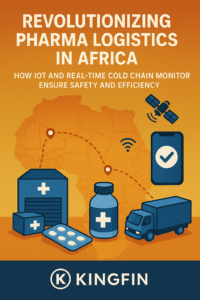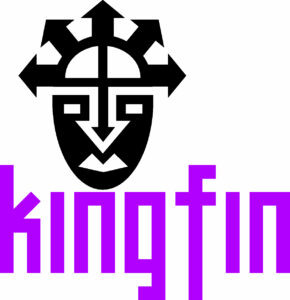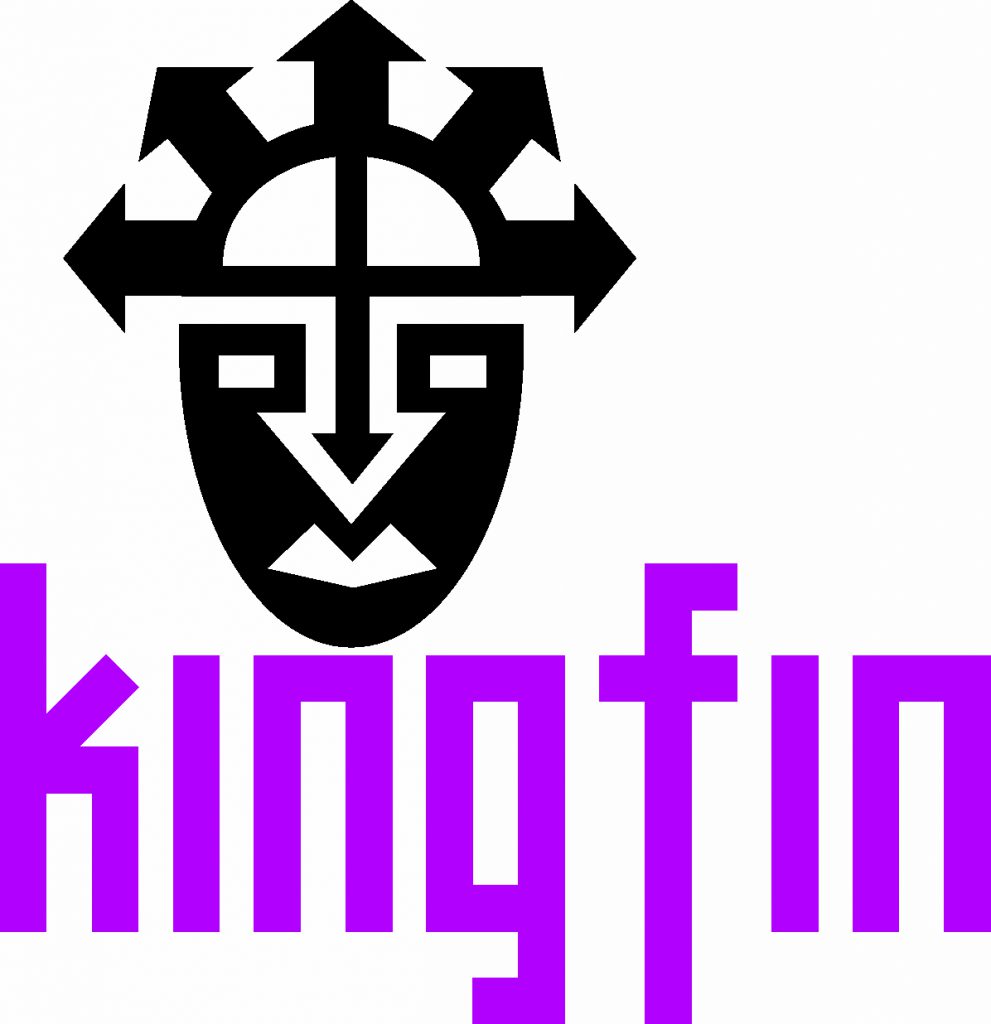
Revolutionizing Pharmaceutical Logistics in Africa: How IoT and Real-Time Cold Chain Monitoring Ensure Safety and Efficiency
Introduction
In the pharmaceutical industry, few aspects are as critical as the cold chain—the temperature-controlled supply chain that ensures drugs, vaccines, and biologics reach patients in a safe and effective state. Any compromise in temperature conditions can render life-saving medications useless, with devastating consequences for both patients and healthcare providers. As the pharmaceutical sector expands across Africa, ensuring resilient and reliable cold chain logistics is not just a challenge but a necessity.
This is where the Internet of Things (IoT) comes in. By enabling real-time monitoring, predictive insights, and proactive interventions, IoT technologies are transforming pharmaceutical logistics worldwide. In Africa, where infrastructure gaps and environmental conditions complicate logistics, IoT solutions are proving especially vital. Kingfin, a leading provider of IoT solutions on the continent, is helping bridge these gaps by delivering innovative, practical, and scalable smart supply chain systems.
In this article, we explore the transformative role of IoT in cold chain pharma logistics, challenges unique to Africa, and how Kingfin is positioning itself as a trusted partner in ensuring safe and efficient pharmaceutical distribution.
The Cold Chain Challenge in Pharma Logistics
Why Cold Chain Integrity Matters
Pharmaceutical products like vaccines, biologics, and insulin are highly sensitive to temperature fluctuations. Even a brief deviation can compromise their efficacy. For example:
- Vaccines must often remain between 2°C and 8°C.
- Some biologics require ultra-low storage at -70°C.
- Insulin must be kept consistently cool to remain safe for patients.
Failure in the cold chain can lead to massive financial losses and, more importantly, endanger patient health. The World Health Organization (WHO) estimates that more than 25% of vaccines are compromised each year due to cold chain failures.
Global and African Context
Globally, the pharmaceutical cold chain is a multi-billion-dollar industry. However, Africa faces unique challenges:
- Limited Infrastructure: Many regions lack consistent electricity, cold storage facilities, and advanced logistics systems.
- Geographic Complexity: Deliveries often cover vast, remote areas with poor road conditions.
- Environmental Conditions: High temperatures and humidity accelerate the risk of spoilage.
- Growing Demand: The rise in vaccines, biologics, and temperature-sensitive medicines highlights the urgency of robust solutions.
Without reliable monitoring, these challenges can severely impact the accessibility and quality of critical healthcare products.
How IoT is Transforming Cold Chain Monitoring
Real-Time Tracking and Monitoring
IoT devices equipped with sensors track temperature, humidity, and location in real-time. Data is transmitted via networks such as LoRaWAN, cellular, or satellite, enabling logistics managers to intervene instantly if conditions deviate.
Advanced Analytics
IoT isn’t just about tracking—it’s about insights. Predictive analytics powered by IoT can:
- Forecast potential risks before they occur.
- Identify inefficiencies in logistics routes.
- Recommend corrective actions to optimize delivery.
Regulatory Compliance
Regulatory authorities demand strict adherence to storage and transportation conditions. IoT solutions provide auditable data trails that help pharmaceutical companies meet these requirements.
Enhanced Visibility
From warehouse to delivery vehicle, IoT creates end-to-end supply chain visibility. This improves accountability, reduces losses, and builds trust among healthcare providers and patients.
Benefits of IoT in Pharma Cold Chain
- Ensuring Drug Quality and Patient Safety: Continuous monitoring ensures patients receive effective and uncompromised medications.
- Reducing Waste and Losses: Real-time alerts minimize spoilage, reducing costly wastage of critical drugs.
- Operational Efficiency: Optimized delivery routes and predictive maintenance lower logistics costs.
- Regulatory Compliance: Automated record-keeping helps companies meet international quality and safety standards.
- Customer Confidence: Reliable cold chain management enhances trust in healthcare systems and pharmaceutical brands.
Cold Chain Logistics in Africa: Opportunities and Challenges
Opportunities
- Growing Pharma Market: Africa’s pharmaceutical industry is expected to grow significantly, driven by population growth and rising healthcare demand.
- Vaccine Distribution: The COVID-19 pandemic underscored the importance of reliable vaccine logistics, setting the stage for improved systems.
- Digital Transformation: Increasing investment in digital technologies creates fertile ground for IoT adoption.
Challenges
- Infrastructure Gaps: Unreliable electricity and limited storage facilities hinder cold chain reliability.
- Environmental Stress: Extreme temperatures increase risks of spoilage.
- Long Supply Routes: Remote communities often require long-distance deliveries across difficult terrains.
- Cost Constraints: Many healthcare providers operate with tight budgets, making affordable IoT solutions critical.
These challenges highlight why Africa needs IoT-driven innovations specifically tailored to its unique logistics environment.
Kingfin’s Role in Smart Supply Chain & Pharma Logistics
Kingfin is at the forefront of solving Africa’s cold chain challenges through smart supply chain IoT solutions. By combining advanced technology with deep local knowledge, Kingfin delivers systems that are:
Key Differentiators
- Tailored for Africa: Designed to work reliably despite infrastructure and environmental limitations.
- Scalable and Affordable: Flexible solutions suitable for both large distributors and small healthcare providers.
- End-to-End Visibility: From warehouse to patient, Kingfin solutions ensure real-time tracking and control.
- Integration with Analytics: Leveraging predictive insights to anticipate and prevent failures.
Use Cases
Kingfin’s Smart Supply Chain & Logistics Use Cases demonstrate practical applications across industries. In pharma logistics, Kingfin solutions:
- Track vaccine shipments from central depots to rural clinics.
- Monitor biologics requiring ultra-low temperatures.
- Provide dashboards and alerts for logistics managers.
- Help reduce operational costs by minimizing spoilage and delays.
With a strong focus on Africa’s logistics challenges, Kingfin is not just providing IoT technology—it is enabling healthcare resilience and trust.
Future of IoT in Pharma Logistics
The future of pharma cold chain monitoring is shaped by emerging technologies:
- Artificial Intelligence (AI): Enhances predictive analytics and automation for greater reliability.
- Blockchain: Provides secure, transparent data sharing across the supply chain.
- Digital Twins: Simulates logistics networks for planning and optimization.
- 5G Connectivity: Enables faster and more reliable real-time monitoring.
For Africa, adopting these technologies will ensure stronger healthcare systems, better patient outcomes, and improved accessibility to essential medicines.
Conclusion & Call to Action
Pharmaceutical cold chain logistics is mission-critical, especially in Africa where unique challenges demand innovative solutions. IoT is revolutionizing how the industry ensures safety, compliance, and efficiency. Kingfin stands out as a trusted partner, delivering tailored IoT solutions that enhance reliability and empower healthcare providers.
As Africa’s pharmaceutical and healthcare industries expand, IoT-driven cold chain monitoring will be a cornerstone of progress. Kingfin is committed to driving this transformation and ensuring that patients across the continent receive life-saving medicines safely and efficiently.
👉 Learn more about how Kingfin can transform your supply chain. Visit our Smart Supply Chain & Logistics Use Cases or contact us today.
Frequently Asked Questions (FAQ)
- Why is cold chain monitoring important in pharmaceutical logistics?
Cold chain monitoring ensures that temperature-sensitive drugs, vaccines, and biologics remain within the required range during storage and transport. This protects patient safety, prevents costly spoilage, and ensures regulatory compliance. - How does IoT improve cold chain logistics?
IoT enables real-time monitoring of temperature, humidity, and location using sensors and connected devices. This allows proactive interventions, reduces losses, and improves visibility across the entire supply chain. - What challenges does Africa face in pharma cold chain logistics?
Infrastructure gaps, power outages, long transportation routes, and harsh climates make it difficult to maintain strict temperature control. IoT solutions help overcome these challenges by providing continuous monitoring and alerts. - How is Kingfin addressing cold chain challenges in Africa?
Kingfin delivers tailored IoT solutions for African logistics, offering real-time tracking, predictive analytics, and smart supply chain systems. Our use cases show how we help healthcare and logistics providers ensure efficiency and safety.
5. What is the future of IoT in pharma supply chains?
The future includes integration of AI for predictive maintenance, blockchain for secure data sharing, and digital twins for supply chain simulations. These innovations will make pharma logistics more reliable and resilient.
Discover how Kingfin’s IoT solutions power real-time cold chain monitoring in pharma logistics, ensuring safety, compliance, and efficiency in Africa.

